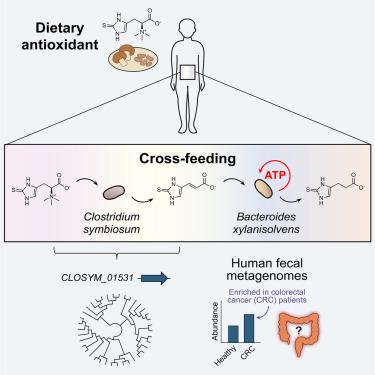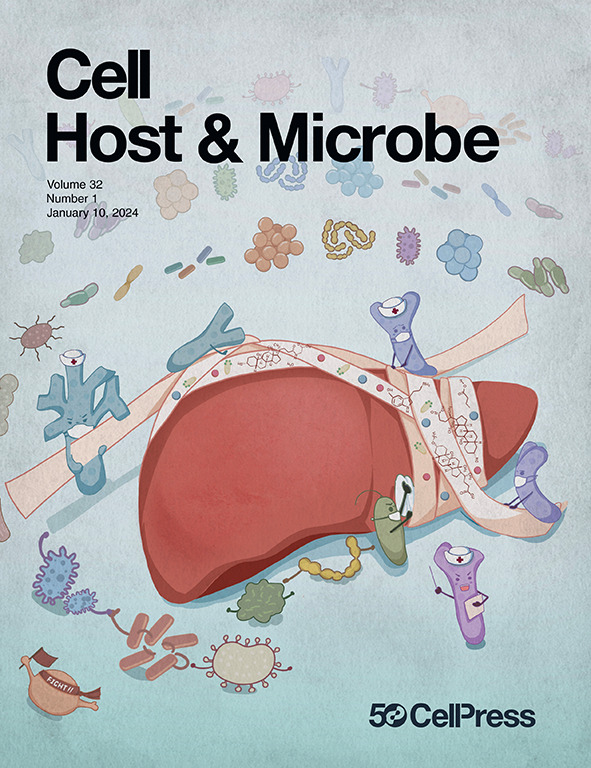Metabolic cross-feeding of a dietary antioxidant enhances anaerobic energy metabolism by human gut bacteria
IF 18.7
1区 医学
Q1 MICROBIOLOGY
引用次数: 0
Abstract
The degradation of complex carbohydrates and other macromolecules by human gut bacteria generates metabolites that are used by neighboring microbes for anaerobic respiration. However, it is largely unknown whether cross-feeding of other dietary compounds can drive energy-yielding redox reactions in the gut. We show that gut bacteria from different phyla cross-feed a common dietary antioxidant to produce energy under anaerobic conditions. Clostridium symbiosum encodes ergothionases that transform ergothioneine, a mushroom-derived antioxidant, into the electron acceptor thiourocanic acid (TUA). TUA is reduced by Bacteroides xylanisolvens, increasing bacterial ATP synthesis and growth. Furthermore, TUA is selectively produced and consumed by certain human fecal microbial communities. Consistent with emerging links between intestinal ergothioneine homeostasis and colorectal cancer, ergothionase is significantly enriched in fecal metagenomes from colorectal cancer patients. Together, these results illustrate how commensalistic cross-feeding of an antioxidant nutrient enhances microbial energy metabolism, which may contribute to interpersonal differences in disease risk.

饲粮中抗氧化剂的代谢交叉喂养促进了人体肠道细菌的厌氧能量代谢
人体肠道细菌对复杂碳水化合物和其他大分子的降解会产生代谢物,这些代谢物被邻近的微生物用于厌氧呼吸。然而,其他膳食化合物的交叉喂养是否能驱动肠道中产生能量的氧化还原反应在很大程度上是未知的。我们发现来自不同门的肠道细菌在厌氧条件下交叉食用一种常见的膳食抗氧化剂来产生能量。共生梭菌编码麦角硫酶,将麦角硫因(一种蘑菇衍生的抗氧化剂)转化为电子受体硫代氨基酸(TUA)。TUA被木聚糖溶杆菌还原,增加细菌ATP的合成和生长。此外,某些人类粪便微生物群落选择性地产生和消耗TUA。与肠道麦角硫因稳态与结直肠癌之间的联系一致,麦角硫因酶在结直肠癌患者的粪便宏基因组中显著富集。总之,这些结果说明了抗氧化营养素的共生交叉喂养如何增强微生物的能量代谢,这可能有助于疾病风险的人际差异。
本文章由计算机程序翻译,如有差异,请以英文原文为准。
求助全文
约1分钟内获得全文
求助全文
来源期刊

Cell host & microbe
生物-微生物学
CiteScore
45.10
自引率
1.70%
发文量
201
审稿时长
4-8 weeks
期刊介绍:
Cell Host & Microbe is a scientific journal that was launched in March 2007. The journal aims to provide a platform for scientists to exchange ideas and concepts related to the study of microbes and their interaction with host organisms at a molecular, cellular, and immune level. It publishes novel findings on a wide range of microorganisms including bacteria, fungi, parasites, and viruses. The journal focuses on the interface between the microbe and its host, whether the host is a vertebrate, invertebrate, or plant, and whether the microbe is pathogenic, non-pathogenic, or commensal. The integrated study of microbes and their interactions with each other, their host, and the cellular environment they inhabit is a unifying theme of the journal. The published work in Cell Host & Microbe is expected to be of exceptional significance within its field and also of interest to researchers in other areas. In addition to primary research articles, the journal features expert analysis, commentary, and reviews on current topics of interest in the field.
 求助内容:
求助内容: 应助结果提醒方式:
应助结果提醒方式:


